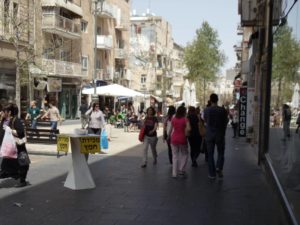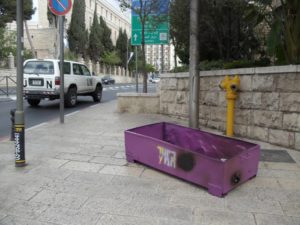A few weeks ago the administrators at school reminded us that the last weeks of the year, the three P’s they call them (Purim, Pesach and Packing), fly by incredibly quickly. Before I knew it, all of the Purim costumes and Hamentashen had disappeared from shelves and people were cleaning their homes and shops.
A week before the next holiday, Super Sol, the grocery store I frequent, had already designated a cleaned aisle for their Kosher for Pesach items while the rest of the store continued to function as normal. As it got even closer to the holiday, you could see people leaning out of their windows beating rugs and shaking out all of the dirt, dust and hametz (non-kosher for Passover foods).
The day before the holiday I had gone out for a walk. The little market near my apartment had most of their food sitting outside as they were scrubbing their shelves and storing their hametz. It was a beautiful spring day and it just felt like it was the right time of year for the holiday. I wandered for an hour or so and found myself on Ben Yehudah Street.
I had always heard that there were places that a person may sell their hametz and it made me smile to see these purchasers in a place like Ben Yehudah. I chose not to take part in this custom, but I loved seeing it as an option.
There is also the custom of burning what is found during bedikat hametz. When I was growing up, we always did this “final search” and collection of non-kosher for Passover food the evening before. The next morning we always burned the last bits of bread in a coffee can in the backyard. The morning of Erev Pesach (the night of Passover) I was walking the street and saw that the city provides places for people to burn the last of their bread (see photo above). It was especially cool to smell the burning loafs of bread and seeing the smoke a few blocks before coming to one.
It’s easy to keep Kosher for Pesach in Jerusalem. Most places are clearly marked as kosher or not. Restobar, one of the restaurants near my apartment, clearly announces that they will not be kosher for Pesach and will be baking bread fresh every day. Everything bears a symbol marking it okay to eat, and even if it is kosher for those that eat kitniyot. You can easily make decisions based on your personal observances.
It isn’t all easy though. Many shops are closed in general. Instead of the cleaning and maintenance required to make a shop kosher for Passover, many keepers take a this as an opportunity for a vacation and close their doors. Outside of Jerusalem it is not as easy to keep kashrut the holiday, but most things are still marked clearly. Even at the bus stations you can find sections of shelves blocked or sealed.
Aside from keeping Passover, the holiday fits perfectly at this time of year. I’ve always like the spring and I’ve really missed being home to watch the snow melt away. But the rains have subsided and the Jerusalem weather changes in a special way. The wet, heavy cold turns into a very springy feeling. The days are warm enough to sit in the sun and even start to catch a tan. On the other hand, the nights continue to be chilly. Slowly but surely, I’m sure the heat will return.
It is almost time for the 4th “P” that HUC forgot to tell us about. Patriotism. Once Pesach ends, the Israeli national holidays are the next observances. It has been incredible being here for all of the holidays this year, and I’m told that these are the most special experiences of the year here. But that does mean that my time in Jerusalem is coming to a close.
I hope to take as many memories from the month or so I have left.
Happy Spring, Chag Sameach and
Shalom From Jerusalem,




